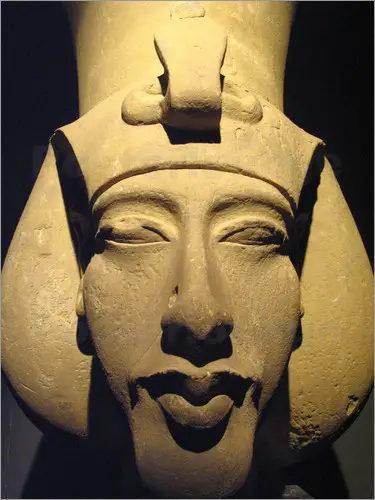Pharaoh Akhenaten

Pharaoh Amenhotep IV was one of the most puzzling pharaohs of Egypt, also mentioned as the ‘Heretic Pharaoh’ or ‘Rebel Pharaoh’. His father was, the King of the 18 th dynasty when Egypt was at its peak. His mother was.
What was unique about her was the she was not a Royal, as it was rare for kings not to marry royalty.Amenhotep IV was different from previous pharaohs in that he was revolutionary, intellectual, and liked philosophy. Because of his position as pharaoh, he had the power to make changes, and so he did—by completely reforming the Egyptian religions. He tried to change the faith from to the one ‘true’ god of (the Sun disc), therefore creating the first monotheistic religion. He then changed his name to Akhenaten, which means ‘the glory of Aten’. Akhenaten built Akhetaton, known today as, to honour the god Aten. The city was extraordinary, with huge buildings and temples, palaces and gardens, and was used as the centre of attacking the old Egyptian religion and its followers—something that made many angry.
Kingdom agency. Amenhotep IV changed his name to Akhenaten and defied tradition by establishing a new religion that believed that there is but one god; the sun god Aten. By the time Akhenaten took the throne, his family had been ruling Egypt for nearly two hundred years and had established a huge empire dominating Palestine, Phoenicia, and Nubia. The effect of these doctrines can be seen in the sun worship of Pharaoh Akhenaten, who became an uncompromising monotheist. Aldred has speculated that monotheism was Akhenaten's own idea, the result of regarding Aten as a self-created heavenly king whose son, the pharaoh, was also unique.

Obviously his revolutionary actions weren’t taken easily by the priesthood and the Egyptians followers of Ra. It was difficult for such a traditional culture to reject their old gods, and the priesthood—which held a great deal of power—would not allow something like this. As a result, Akhenaten’s actions faced resistance, and it wasn’t very long before his son, Tutankhamen, restored the old religion, disregarding his father’s actions.Akhenaten married, an Egyptian whose parentage is unknown, as well as her birthdate and the date of her death. Both Nefertiti and Akhenaton are portrayed with prolonged skulls, and depictions of Akhenaton exhibit female. Many theories exist related to their skulls, ranging from conformity, to artificial methods of prolonging them, to the possibility that they have; however none of this is proven.All physical traces of them have disappeared, and nothing is known about their death. Akhenaten is the only pharaoh of the 18 th Dynasty whose mummy has not been found, and after their deaths and disappearances—Nefertiti earlier than Akhenaten—they were never mentioned again in any historical records.
Their were discovered in the 1890’s, but they were. It was as if they were never used. It can only be assumed that after their disappearance, everything was destroyed and the monotheistic religion was lostor was it? Other controversial aspects regarding Akhenaten and Nefertiti puzzle archaeologists, the most important one being the connection between. According to the Ptolemaic Egyptian historian and High Priest of Heliopolis, who wrote the History of Egypt ( ), at about the third century BC, there are references of Moses and Akhenaten living during the same period—something that goes against Christian and Jewish beliefs. Manetho recorded details about Moses and the Exodus, placing the event precisely during the period of Akhenaten’s reign. Not only that, but he states that Moses (whose name was Osarseph after the god Osiris) received much of his education under Akhenaten and helped to establish the new monotheistic religion of Aten.Based on Manetho’s description, and taking into account how Akhenaten disappeared, there are a few that believe that Moses was Akhenaten.Akhenaten was someone who went against all the deeply held traditions of Egypt and tried to establish a new religion.
Both he and his wife had unusual physical characteristics, and both disappeared from history. All of this evidence has led many to assume that Akhenaten and Nefertiti weren’t ordinary people, maybe. Perhaps they were extra-terrestrial, or were connected to a singular ‘real god’ who commanded them to create a religion around him that Moses later took away from Egypt and began promoting on his own. These are all logical conclusions based on what is presented, however nothing is certain and questions are yet to be answered. At Ancient Origins, we believe that one of the most important fields of knowledge we can pursue as human beings is our beginnings.